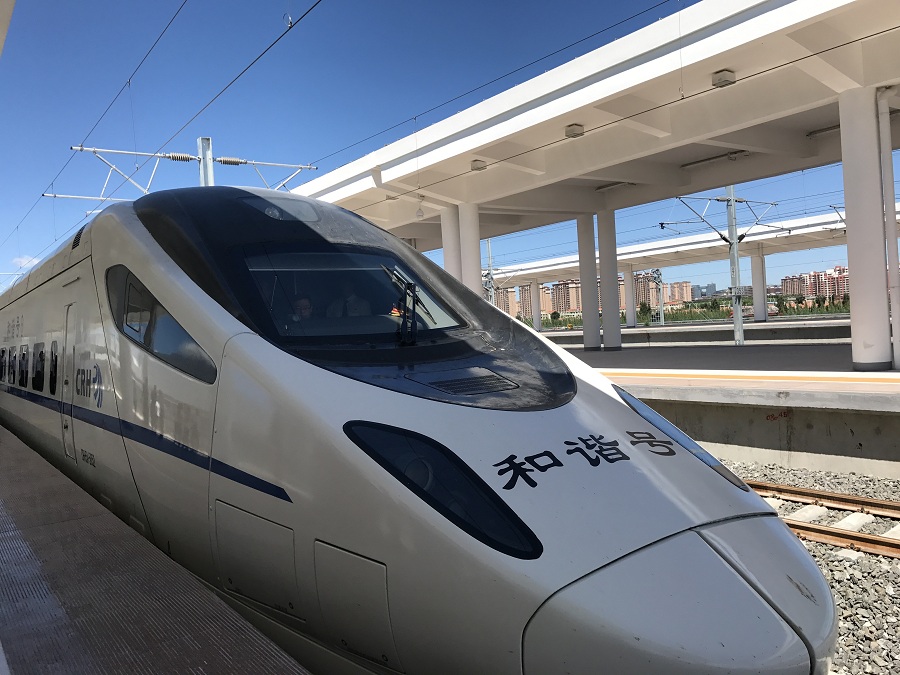Four ultra-high voltage lines to send electricity out
(chinadaily.com.cn)
Updated: 2014-11-21
Export capacity doubles
The ultra high-voltage AC project between Xilin Gol League and Shandong is only one of the four ultra high-voltage lines in Inner Mongolia. The ultra high-voltage lines from the west Inner Mongolia to south Tianjin project will build four high-voltage transformer substations in west Inner Mongolia, north Shanxi, west Beijing and south Tianjin, with substation capacity of 24 million kilovolt-amperes involving two lines each running 608 kilometers and an investment of 17.5 billion yuan.
At present, the project has finished preparatory work for approval and has reported for superior instructions. It’s scheduled to run in 2016. In addition, the 800-kilowatt DC project from Xilin Gol League to Jiangsu will have two converter stations built at Xilin Gol League and Taizhou, with a capacity of 20 million kilowatts. It involves a line running 1,620 kilometers and an investment of 27.5 billion yuan.
At the moment, the project has received feasibility study review and plans to report to the superior unit for approval in the first quarter of 2015 and go into operation in 2017. The 800-kilowatt DC project from Shanghaimiao to Shandong will have two converter stations built at Shanghaimiao and Linyi, with a capacity of 20 million kilowatts and involving a line running 1,150 kilometers and an investment of 24.5 billion yuan. At the moment, the project has finished feasibility study review and plans to report to the superior unit for approval in the first quarter of 2015 and go into operation in 2017.
Inner Mongolia’s electricity transportation capacity will see significant increases to more than 30 million kilowatts when the four ultra high-voltage channels come into service, according to Li Weiguo, director of development planning department of East Inner Mongolia Electric Power Co. Annual power delivery will increase roughly by 200 billion kilowatts. In this way, the power transportation capacity will be doubled by 2017, as compared with 2013.
Speed up clean energy facility constructionInner Mongolia’s proven coal resources stand at 400 billion tons, and developable wind power stands at 400 million kilowatts, both ranking first nationwide. Of the five comprehensive energy facilities in China’s national plan during 2011-2015, two sit in Inner Mongolia’s Ordos Basin and eastern part of Inner Mongolia. Both happen to be the starting point of the four ultra-high voltage power transmission channels.
Li Weiguo believed that the large-capacity power channel can help more regions enjoy green energy and is an inevitable choice for Inner Mongolia to achieve the goal of becoming a national clean energy export facility.
“Inner Mongolia will build 12 ultra-high voltage power transmission channels by 2020, according to the overall plan of State Grid Corp,” Li said. The ultra-high voltage AC and DC grids will help increase transportation capacity by 100 million kilowatts, pull in 900 billion yuan in power investment in the region, raise GDP by 30 billion yuan every year and offer 84,000 job opportunities, according to Li.
The region’s power transportation scale will hit 130 million kilowatts in the future, sending out 830-billion kilowatts of electricity. An extra 380 million tons of coal will be converted locally, and problems in power export and large-scale clean energy development will be fully addressed.

High-speed train debuts in Inner Mongolia
A bullet train departed Hohhot East Railway Station for Ulanqab marking the start of high-speed rail services using Inner Mongolia’s first newly-laid high-speed railway on Aug 3.
